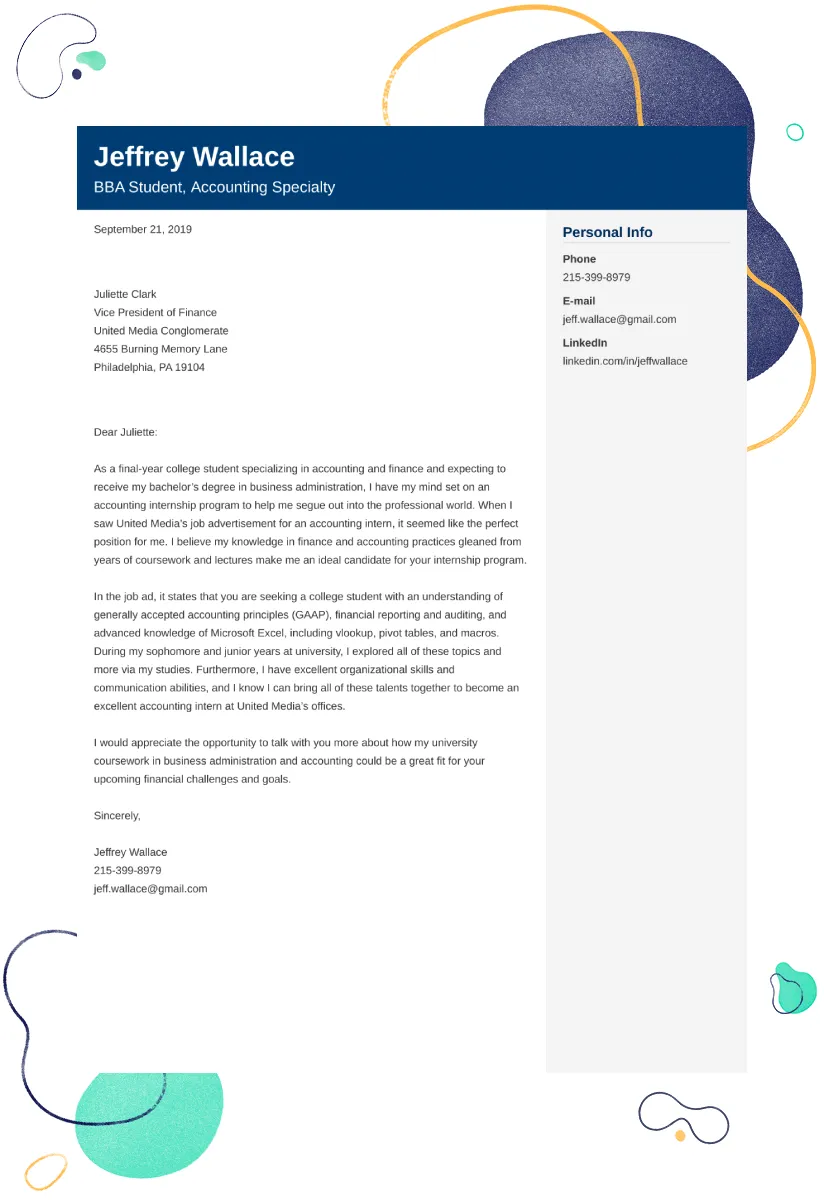Crafting a Winning Accounting Cover Letter
In the competitive world of accounting, a well-crafted cover letter can be the key to unlocking your dream job. It’s your chance to make a strong first impression, showcase your personality, and highlight why you’re the perfect fit for the role. This guide will walk you through essential components and provide actionable examples to help you create an accounting cover letter that stands out and wins.
Understanding the Importance of a Cover Letter
Why a Cover Letter Matters
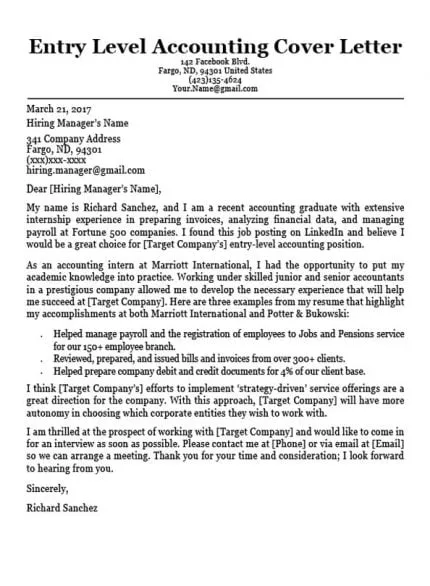
While your resume provides a snapshot of your experience, a cover letter allows you to tell a story. It’s where you can articulate your passion for accounting, connect your skills to the specific job requirements, and demonstrate your understanding of the company. In many cases, a cover letter is the first thing a hiring manager will see, setting the tone for your application and influencing their initial impression. It offers an opportunity to showcase your communication skills and personality beyond the bullet points of your resume. Neglecting a cover letter, or submitting a generic one, can signal a lack of genuine interest and attention to detail, two crucial traits for any accounting professional.
Key Elements of a Successful Accounting Cover Letter
Personalized Greeting and Introduction
Always address your cover letter to a specific person, if possible. Research the hiring manager’s name and title; addressing the letter directly shows initiative and attention to detail. Your introduction should immediately grab the reader’s attention by expressing your enthusiasm for the position and the company. Briefly state why you’re excited about the opportunity and what makes you a strong candidate. Avoid generic opening lines, such as “I am writing to express my interest…” Instead, create an opening that is specific, compelling, and shows your understanding of the role and the company’s needs. For example, if the job description emphasizes a need for experience with a particular accounting software, mention your experience with that software in the introduction. (Image: accounting-cover-letter.webp)
Highlighting Relevant Skills and Experience
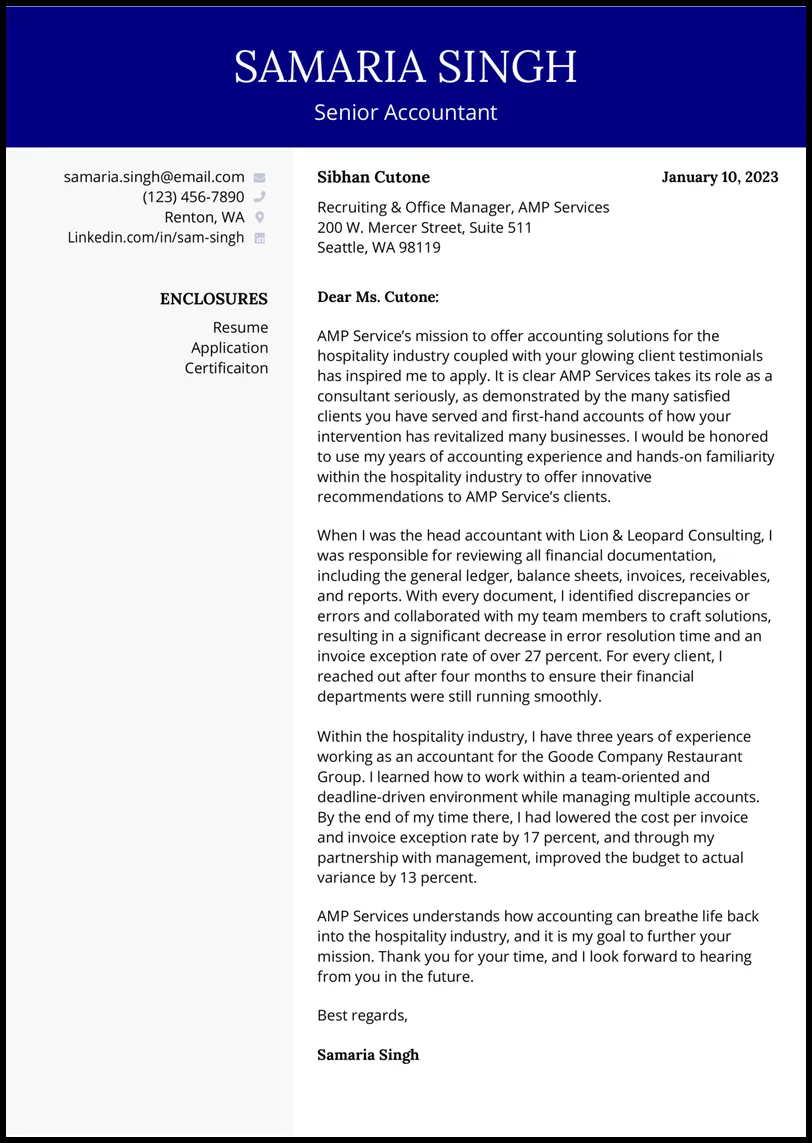
The body of your cover letter is where you demonstrate your value. Focus on skills and experience that directly align with the job requirements. Review the job description carefully and identify the key qualifications the employer is seeking. Then, provide specific examples from your professional history that showcase your abilities. This is your chance to elaborate on your resume and provide context for your achievements. Structure your paragraphs logically, using clear and concise language. Use action verbs to describe your accomplishments. For instance, instead of saying “Responsible for accounts payable,” say “Managed accounts payable for over 100 vendors, resulting in a 15% reduction in processing time.” (Image: skills-experience.webp)
Quantifying Achievements with Numbers
Whenever possible, quantify your achievements to demonstrate the impact you’ve made in previous roles. Use numbers and data to illustrate your success. Instead of saying “Improved efficiency,” specify by how much. For example, “Streamlined the month-end closing process, reducing the time required by 20%.” This demonstrates a clear understanding of performance metrics and your ability to contribute to the company’s bottom line. Accounting is a field built on numbers, so using numbers to showcase your abilities is a compelling way to capture the hiring manager’s attention and differentiate yourself from other applicants. Using percentages, dollar amounts, or other measurable results will provide the hiring manager with tangible evidence of your value.
Demonstrating Knowledge of the Company
Demonstrate that you’ve done your research by mentioning specific aspects of the company that interest you. This shows your genuine enthusiasm and indicates that you’re not simply sending out generic applications. Visit the company’s website, read news articles, and check their social media presence to learn about their mission, values, and recent accomplishments. In your cover letter, you can reference specific projects, initiatives, or company values that resonate with you. For instance, if the company emphasizes sustainability, you could mention your interest in their efforts and how your skills could contribute to their goals. Showing that you understand the company’s business and its place in the market can set you apart from other candidates. (Image: company-research.webp)
The Importance of a Strong Closing
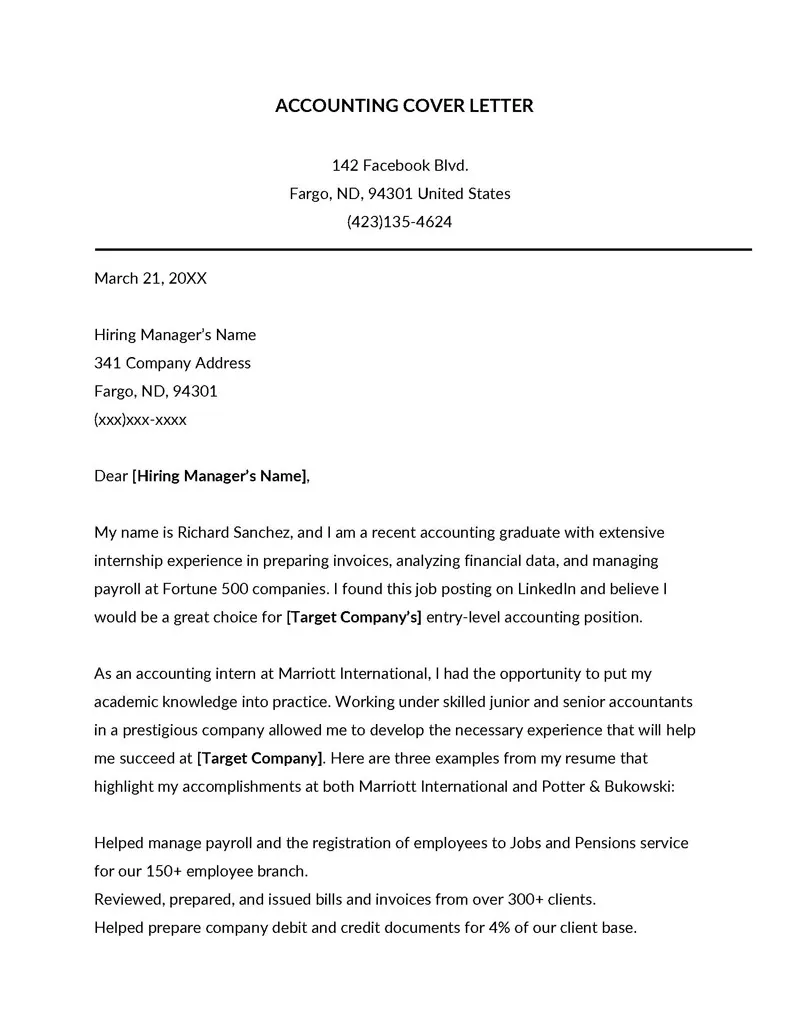
Your closing paragraph should reiterate your interest in the position and express your eagerness to learn more. Restate your key qualifications and thank the hiring manager for their time and consideration. Include a clear call to action, such as, “I am eager to discuss how my skills and experience can benefit your team. I am available for an interview at your earliest convenience.” Avoid clichés like “Thank you for your consideration” or “I look forward to hearing from you.” Instead, try a closing statement that reinforces your value proposition and leaves a lasting impression. Proofread your closing paragraph carefully to ensure it is free of errors and conveys professionalism. (Image: strong-closing.webp)
Accounting Cover Letter Examples to Inspire You
Entry-Level Accounting Cover Letter Example
This example is tailored for candidates with little to no professional experience. It focuses on academic achievements, relevant coursework, internships, and any volunteer experiences that showcase accounting skills. The tone should be enthusiastic and eager to learn. Highlight any specific projects or skills learned during your education that are applicable to the job. If you have completed an internship, be sure to describe your responsibilities and any achievements. Avoid excessive use of technical jargon, and focus on clear, concise language that emphasizes your potential.
Mid-Level Accounting Cover Letter Example
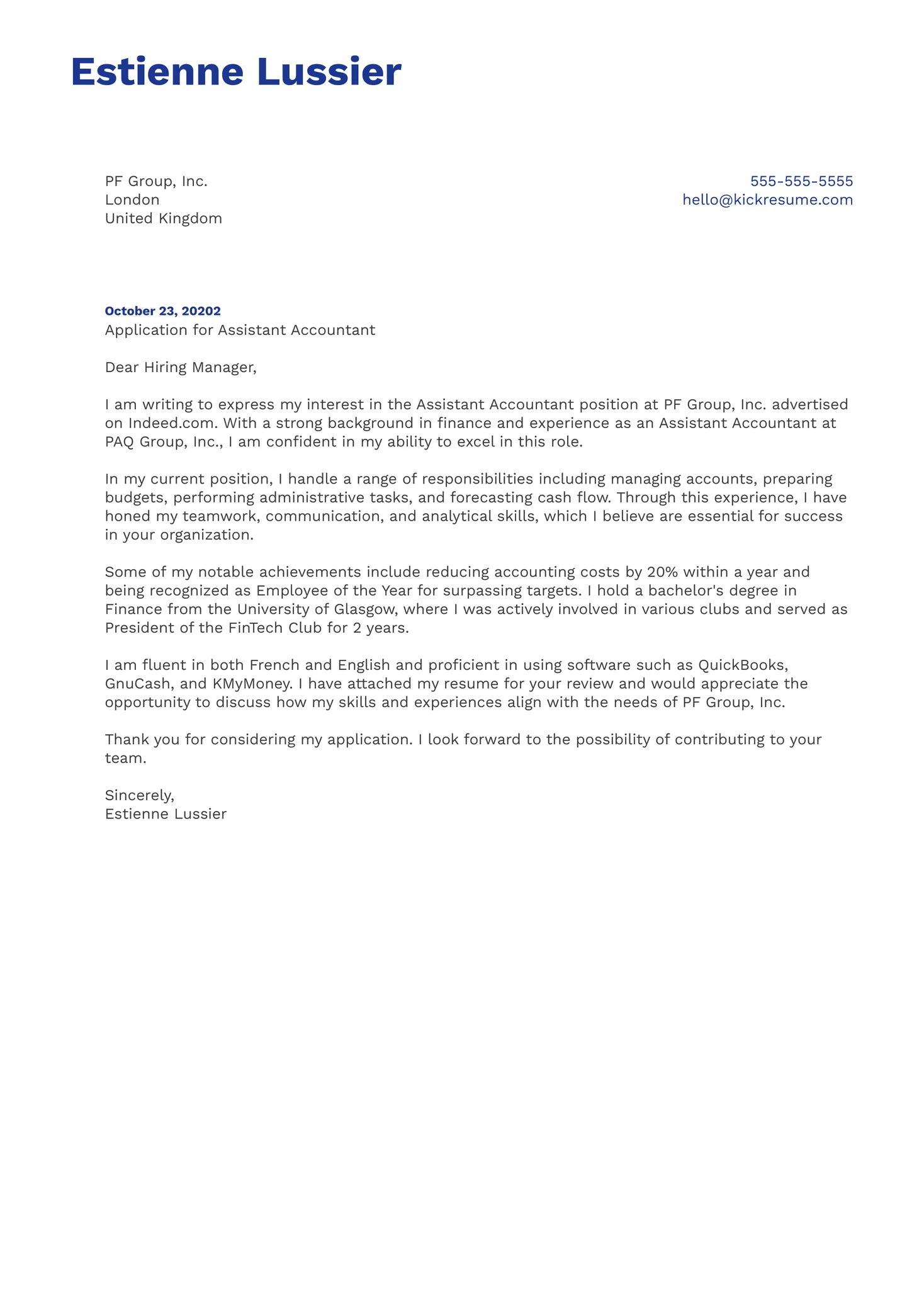
This example suits professionals with several years of experience. It should highlight your experience, technical skills, and any specific accomplishments achieved in your previous roles. Quantify your achievements with numbers whenever possible. Focus on skills like financial reporting, budgeting, and tax preparation. If you have managed a team or led projects, be sure to highlight those experiences. Demonstrate that you’re a results-oriented professional. Showcasing your proficiency in accounting software and your ability to adapt to new challenges is essential for mid-level positions.
Senior Accounting Cover Letter Example
This example targets senior-level candidates. It should demonstrate leadership experience, strategic thinking, and a deep understanding of accounting principles. Highlight your successes in previous management roles, such as improving financial performance, streamlining processes, or implementing new accounting systems. Mention any specific areas of expertise, such as auditing, compliance, or financial analysis. Your cover letter should communicate your ability to drive strategic initiatives and contribute to the long-term success of the company. (Image: winning-cover-letter.webp)
Cover Letter Mistakes to Avoid
Generic Language and Lack of Personalization
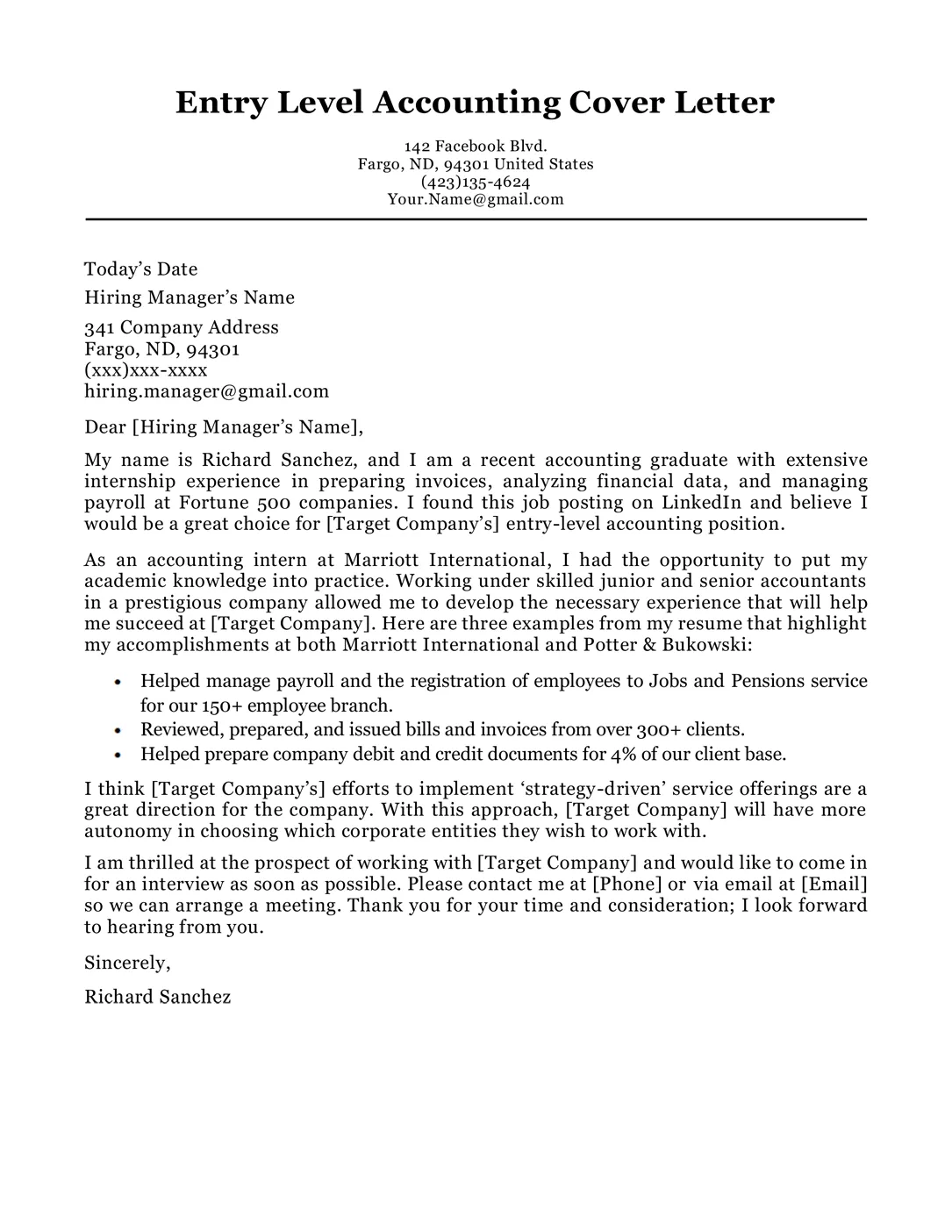
Avoid sending a generic cover letter that could be used for any job. Tailor each letter to the specific position and company. Use the job description as your guide and address the hiring manager by name. Avoid using clichés and phrases that don’t add value. A generic letter indicates a lack of genuine interest and can lead to your application being overlooked. Show the hiring manager that you’ve done your homework and that you’re genuinely interested in the opportunity and the company culture. Demonstrate a strong understanding of the company’s specific needs.
Typos and Grammatical Errors
Proofread your cover letter meticulously. Typos and grammatical errors can damage your credibility and professionalism. Use spell check and grammar check tools, but also read the letter aloud to catch any errors. Have a friend or colleague review your cover letter to provide a fresh perspective. Errors can be a sign of carelessness or lack of attention to detail, traits that are undesirable in an accounting professional. Correct spelling and grammar are essential, so take your time and ensure your letter is polished and error-free. (Image: formatting-cover-letter.webp)
Focusing Solely on Responsibilities Instead of Achievements
While it’s important to mention your responsibilities, focus on your achievements. Instead of simply stating what you did in your previous roles, explain the positive outcomes you achieved. Use the STAR method (Situation, Task, Action, Result) to frame your accomplishments effectively. Provide specific examples of how you improved efficiency, reduced costs, or increased revenue. Demonstrating that you’ve made a tangible impact in your previous roles is key. Provide data, percentages, or dollar amounts to illustrate your contributions, showing potential employers the value you can bring to their organization. (Image: cover-letter-mistakes.webp)
Formatting and Presentation
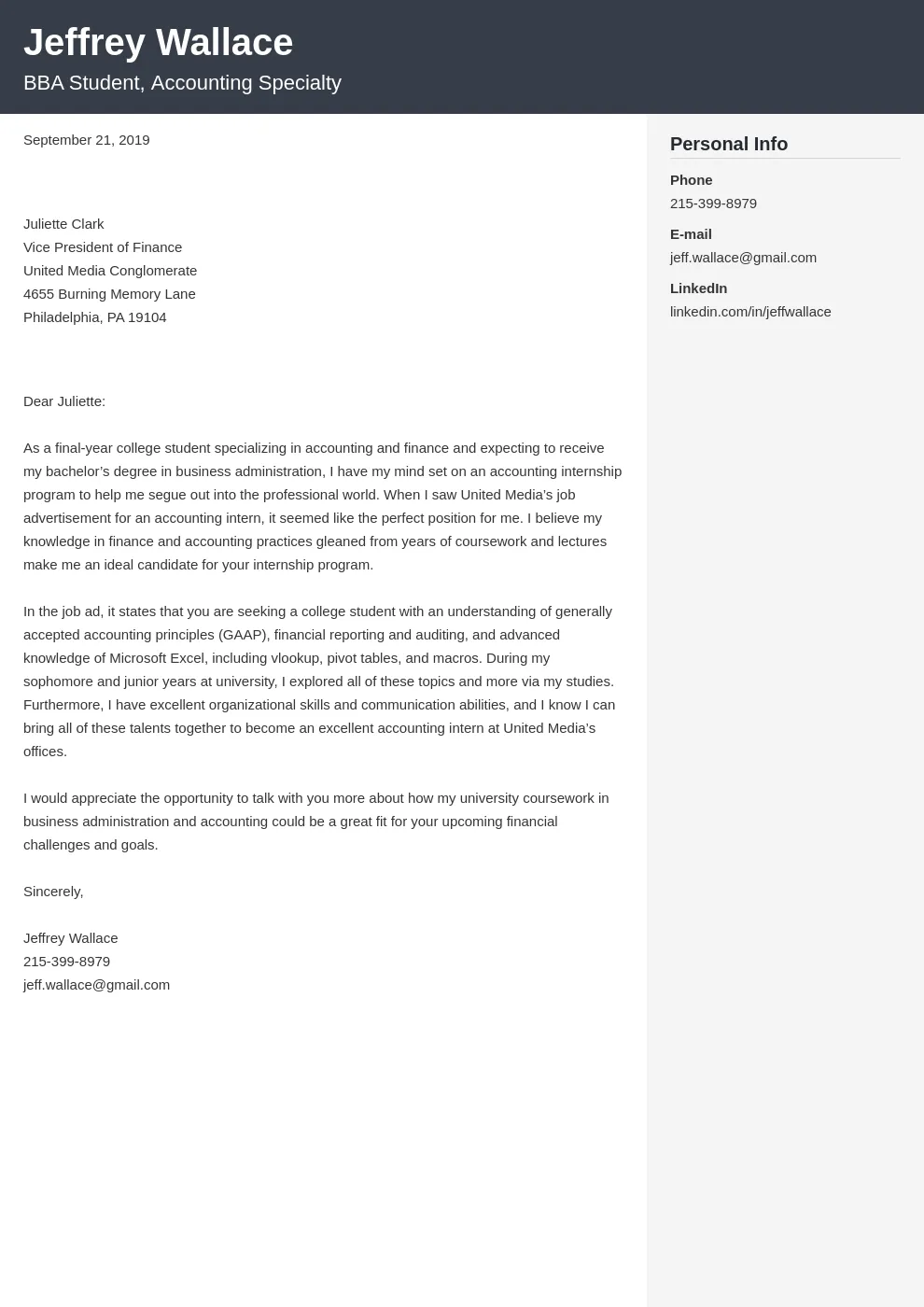
Choosing the Right Font and Font Size
Choose a professional and easy-to-read font, such as Times New Roman, Arial, or Calibri. Keep the font size between 10 and 12 points for optimal readability. Avoid using overly stylized or decorative fonts. Consistency is key – use the same font and size throughout your cover letter. A well-formatted cover letter is visually appealing and easy to navigate, making it more likely that the hiring manager will read the entire document. Consider the overall layout and ensure it’s clean and professional. (Image: formatting-cover-letter.webp)
Proper Use of White Space
Use adequate white space to make your cover letter visually appealing and easy to read. Leave margins of at least one inch on all sides of the page. Separate paragraphs with a blank line to improve readability. Avoid cramming too much text onto one page. Proper use of white space makes your cover letter less intimidating and more engaging for the reader. This allows the hiring manager to quickly scan the document and identify key information. Ensure your cover letter has a clean and professional appearance.
Proofreading and Editing
Proofread your cover letter multiple times, checking for any errors in grammar, spelling, and punctuation. Have a friend or colleague review your cover letter to provide feedback. Ensure that the tone and style are appropriate for a professional setting. A well-proofread cover letter demonstrates attention to detail and a commitment to quality. Proofreading also helps to ensure that your cover letter communicates your message clearly and effectively.
Tailoring Your Cover Letter for Maximum Impact
Researching the Company and the Role
Before you start writing your cover letter, research the company and the specific role you’re applying for. Understand the company’s mission, values, and culture. Review the job description carefully and identify the key skills and qualifications the employer is seeking. Demonstrating that you understand the company’s business and its place in the market can set you apart from other candidates. Show the hiring manager that you’ve done your homework and that you’re genuinely interested in the opportunity and the company culture. Mentioning specific projects, initiatives, or company values can greatly increase your chances of getting noticed. (Image: company-research.webp)
Adapting the Cover Letter to the Job Description
Customize your cover letter to align with the job description. Use the job description as your guide and highlight the skills and experience that are most relevant to the position. Use the same keywords and phrases that are used in the job description, but avoid keyword stuffing. Show the hiring manager how your skills and experience meet their specific needs. Each cover letter should be unique and tailored to the specific job. A generic cover letter will not resonate with the hiring manager, so take the time to customize yours for each application.
Showcasing Your Unique Value Proposition
Identify your unique selling points and highlight them in your cover letter. What sets you apart from other candidates? Are you particularly skilled in a specific area of accounting, such as auditing, tax preparation, or financial analysis? Do you have experience working with specific accounting software or systems? Emphasize the skills and experience that make you a valuable asset to the company. Show the hiring manager what makes you the ideal candidate for the job, and communicate how you can contribute to their organization. Tailor your cover letter to highlight the unique value you can provide. (Image: skills-experience.webp)
Call to Action and Follow-Up
Include a clear call to action in your closing paragraph, expressing your interest in the position and stating your availability for an interview. Thank the hiring manager for their time and consideration. Following up after submitting your application can demonstrate your continued interest. Send a brief email or make a phone call a week or two after submitting your application to reiterate your interest and inquire about the status of your application. However, be mindful of the company’s application instructions; some companies may discourage follow-up communication. If you have not heard back within a reasonable timeframe, follow up professionally and respectfully. (Image: strong-closing.webp)
